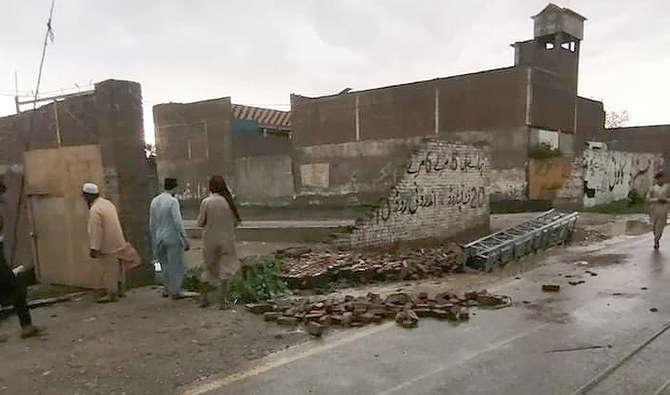PESHAWAR: Pakistan witnessed another extreme weather event on Saturday when a violent rainstorm claimed the lives of 25 people, including seven children, and left many more injured in the northwestern Khyber Pakhtunkhwa province where officials placed local hospitals on alert.
The country has been facing a range of climate-related challenges and is considered one of the top 10 places in the world most vulnerable to erratic weather patterns, despite contributing less than one percent to global carbon emissions.
In recent decades, Pakistan’s southern region has endured unprecedented heatwaves. Last year, heavy monsoon rains and floods submerged about one-third of its landmass, resulting in over 1,700 deaths and an estimated $30 billion worth of damage.
The rainstorm on Saturday primarily affected Bannu division near the border with Afghanistan, according to data circulated by the Provincial Disaster Management Authority (PDMA) in tabulated form that mentioned the death of 25 people.
Prior to the release of the official statistics, the area’s commissioner, Pervez Patik Khel, reported the army had started engaging in rescue work in the area.
“Police and district administration are also on alert, and the damage due to the rainstorm is currently being assessed,” he said.
Rescue 1122 officials also stated their teams had initiated operations in Bannu and Karak cities, where casualties were reported.
“Several women and children are among the dead and injured,” said Bilal Faizi, who works with the rescue service.
He informed there were reports of crumbling walls and collapsing roofs in others areas of the province, including Peshawar.
Taimur Ali, spokesperson for the provincial disaster management authority, stated the rainstorm had caused significant destruction in Bannu, Lakki Marwat, Karak, and Dera Ismail Khan districts.
He added the respective district administrations had been instructed to assess the damages.
KP’s caretaker chief minister, Azam Khan, expressed sorrow over the human and financial losses resulting from the rainstorm. He urged relevant authorities to initiate relief activities as soon as possible.












